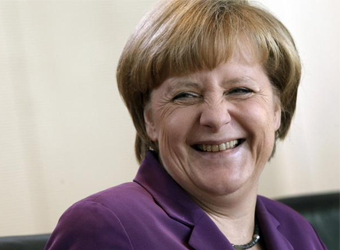The question of who is going to be Germany’s next Chancellor looks increasingly unlikely with the current incumbent, Angela Merkel seeing her lead in the opinion polls being eroded by socialist leader Martin Schulz.
The outcome of the autumn federal elections is looking increasingly uncertain thanks to a combination of Schulz and the stronger chances of seeing the far-right Alternative for Deutschland party (AfD) getting its first parliamentary seats.
“I don’t think there would be that much of a difference (between Merkel and Schulz) to be honest in terms of policy,” Pepijn Bergsen, analyst at the Economist Intelligence Unit, told CNBC on Monday.
However, he added that one still needs to know the program of the socialist leader. “There’s been quite a lot of campaign phrases from Mr Schulz but no real policy platform yet.”
Schulz has been gathering momentum in opinion polls, with the latest prediction placing him one percentage point below Merkel. An Emnid poll released last Saturday showed 33 percent of votes for Merkel’s CDU, followed by 32 percent of the voting intentions to Schulz’s SPD and 10 percent for the far-right AfD.
“He doesn’t quite fit the model of traditional German politician, he doesn’t have a whole long list of titles behind his name, having dropped out of secondary school…it is something new even though he is still part of the establishment,” Bergsen told CNBC about Schulz, who previously served as president of the European Parliament.
Schulz’s experience in European Union politics has allowed him not to be associated with the socialist party in Germany and some of its less popular policies, including the support for labor market reforms. Nonetheless, he also lacks experience in German politics at the national level, having moved from being a mayor at a small German town to the
European Parliament.
Schulz, just like Merkel, has to deal with the growing support for the populist AfD.
“Germany seems to be a bit behind to a lot of other European nations in that move towards that populist vote,” Bergsen told CNBC while noting that the AfD is almost certain to get into parliament after the election vote.
Such surge for the AfD is set to complicate coalition dynamics.
German voters elected Frank Walter Steinmeier, a former foreign minister, as their next president on Sunday. The role is mostly symbolic, but Steinmeier was supported by the socialist party, which has added pressure on Merkel and her CDU party.
On Saturday, the German finance minister Wolfgang Schauble told the press that Schulz is like the U.S. President Donald Trump, for allowing his supporters to chant “Make Europe great again.”
“This is just the first round of attacks from the CDU on what is still quite a new figure in German national politics,” Bergsen told CNBC.
Source: CNBC
